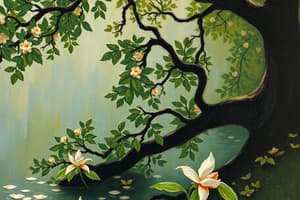Podcast
Questions and Answers
What are literary elements?
What are literary elements?
- Setting, character, plot, style, point of view, mood/tone, theme (correct)
- Narrative devices
- Just character and setting
- Only plot and theme
What is setting in literature?
What is setting in literature?
The environment or surrounding in which an event or story takes place.
What is mood in literature?
What is mood in literature?
The feeling or atmosphere that a writer creates for the reader.
What is a protagonist?
What is a protagonist?
What is an antagonist?
What is an antagonist?
What is conflict in literature?
What is conflict in literature?
What is plot in literature?
What is plot in literature?
What are the events of a plot?
What are the events of a plot?
What is exposition in literature?
What is exposition in literature?
What is climax in literature?
What is climax in literature?
What is resolution in literature?
What is resolution in literature?
What is characterization?
What is characterization?
What is direct characterization?
What is direct characterization?
What is indirect characterization?
What is indirect characterization?
What is theme in literature?
What is theme in literature?
What is tone in literature?
What is tone in literature?
What is an example of mood in literature?
What is an example of mood in literature?
What is an example of theme in literature?
What is an example of theme in literature?
What is an example of direct characterization?
What is an example of direct characterization?
What is an example of tone in literature?
What is an example of tone in literature?
What is an example of indirect characterization?
What is an example of indirect characterization?
What are literary devices?
What are literary devices?
What is a metaphor?
What is a metaphor?
Flashcards are hidden until you start studying
Study Notes
Literary Elements
- Universal components of literature include setting, character, plot, style, point of view, mood/tone, and theme.
- Found in both written and oral stories.
Setting
- Refers to the environment or surrounding context of a story.
- Includes information about time and place.
Mood
- The atmosphere or feeling created by the writer for the reader.
Protagonist
- The main character or central figure in a literary work.
Antagonist
- A character or force that opposes the protagonist.
Conflict
- Represents a struggle between opposing forces, typically between the protagonist and antagonist.
Plot
- The sequence of events that make up a story.
Events of a Plot
- Consists of exposition, conflict, rising action, climax, falling action, and resolution or denouement.
Exposition
- A narrative device usually used at the beginning of a story that provides essential background information about characters and their situations.
Climax
- The most exciting moment or turning point in a story.
Resolution
- Completes the story; it can evoke various feelings in the reader and is also known as denouement.
Characterization
- The method through which a writer reveals a character's personality.
Direct Characterization
- The author explicitly states a character's traits.
Indirect Characterization
- A character's personality is revealed through their actions, words, appearance, and interactions with others.
Theme
- A central message or unifying idea within a literary work.
Tone
- The writer's attitude toward the subject, expressed through diction and figurative language.
Example of Mood
- A mysterious mood is reflected in phrases like "Once upon a midnight dreary, while I pondered, weak and weary."
Example of Theme
- Explores the idea that pride, though sometimes positive, can become destructive if rooted in selfishness.
Example of Direct Characterization
- An example is describing characters as “The patient boy and quiet girl were both well-mannered and did not disobey their mother.”
Example of Tone
- J.K. Rowling maintains a positive and uplifting tone in her depiction of love and devotion in the Harry Potter series.
Example of Indirect Characterization
- An example is found in the line, "He sat until he was called upon," which reveals character traits through behavior.
Literary Devices
- Refers to a variety of techniques, such as figurative language, imagery, allegory, and symbolism, used by writers to convey messages.
- Not universally present in all literary works.
Metaphor
- A figure of speech used for comparison, implying an analogy between two unrelated things.
Studying That Suits You
Use AI to generate personalized quizzes and flashcards to suit your learning preferences.




